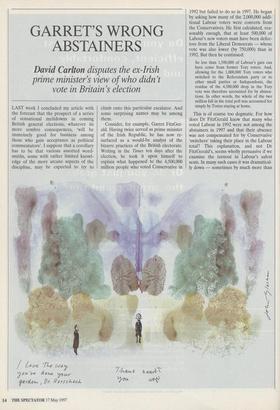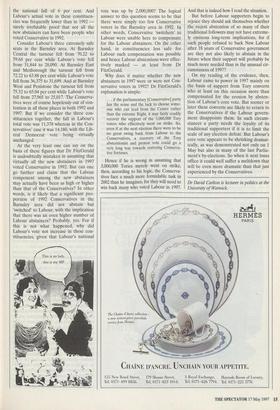GARRET'S WRONG ABSTAINERS
David Carlton disputes the ex-Irish
prime minister's view of who didn't vote in Britain's election
LAST week I concluded my article with the forecast that the prospect of a series of sensational meltdowns in coming British general elections, whatever its more sombre consequences, 'will be immensely good for business among those who gain acceptance as political commentators'. I suppose that a corollary has to be that various assorted word- smiths, some with rather limited knowl- edge of the more arcane aspects of the discipline, may be expected to try to climb onto this particular escalator. And some surprising names may be among them.
Consider, for example, Garret FitzGer- ald. Having twice served as prime minister of the Irish Republic, he has now re- surfaced as a would-be analyst of the bizarre practices of the British electorate. Writing in the Times ten days after the election, he took it upon himself to explain what happened to the 4,500,000 million people who voted Conservative in 1992 but failed to do so in 1997. He began by asking how many of the 2,000,000 addi- tional Labour voters were converts from the Conservatives. He first calculated, rea- sonably enough, that at least 500,000 of Labour's new voters must have been defec- tors from the Liberal Democrats — whose vote was also lower (by 750,000) than in 1992. But then he continued:
So less than 1,500,000 of Labour's gain can have come from former Tory voters. And, allowing for the 1,000,000 Tory voters who switched to the Referendum party or to other small parties or Independents, the residue of the 4,500,000 drop in the Tory vote was therefore accounted for by absten- tions. In other words, the whole of the two million fall in the total poll was accounted for simply by Tories staying at home.
This is of course too dogmatic. For how does Dr FitzGerald know that many who voted Labour in 1992 were not among the abstainers in 1997 and that their absence was not compensated for by Conservative twitchers' taking their place in the Labour total? This explanation, and not Dr FitzGerald's, seems wholly persuasive if we examine the turnout in Labour's safest seats. In many such cases it was dramatical- ly down — sometimes by much more than the national fall of 6 per cent. And Labour's actual vote in these constituen- cies was frequently lower than in 1992 surely irrefutable proof that not all the new abstainers can have been people who voted Conservative in 1992.
Consider Labour's three extremely safe seats in the Barnsley area. At Barnsley Central the turnout fell from 70.22 to 59.68 per cent while Labour's vote fell from 31,844 to 28,090. At Barnsley East and Mexborough the turnout fell from 72.22 to 63.88 per cent while Labour's vote fell from 36,375 to 31,699. And at Barnsley West and Penistone the turnout fell from 75.32 to 65.04 per cent while Labour's vote fell from 27,965 to 25,017. The Conserva- tives were of course hopelessly out of con- tention in all these places in both 1992 and 1997. But if we consider the three con- stituencies together, the fall in Labour's total vote was 11,378 whereas in the Con- servatives' case it was 14,180, with the Lib- eral Democrat vote being virtually unchanged.
At the very least one can say on the basis of these figures that Dr FitzGerald is undoubtedly mistaken in assuming that virtually all the new abstainers in 1997 voted Conservative in 1992. But can one go further and claim that the Labour component among the new abstainers may actually have been as high or higher than that of the Conservatives? In other words, is it likely that a significant pro- portion of 1992 Conservatives in the Barnsley area did not abstain but `switched' to Labour, with the implication that there was an even higher number of Labour abstainers? Probably, yes. For if this is not what happened, why did Labour's vote not increase in these con- stituencies, given that Labour's national vote was up by 2,000,000? The logical answer to this question seems to be that there were simply too few Conservative voters in the Barnsley area in 1992. In other words, Conservative `switchers' to Labour were unable here to compensate for the Labour abstainers. On the other hand, in constituencies less safe for Labour such compensation was possible and hence Labour abstentions were effec- tively masked — at least from Dr FitzGerald.
Why does it matter whether the new abstainers in 1997 were or were not Con- servative voters in 1992? Dr FitzGerald's explanation is simple: ... if the parliamentary [Conservative] party has the sense and the luck to choose some- one who can lead from the Centre rather than the extreme Right, it may fairly readily recover the support of the 3,000,000 Tory voters who effectively went on strike. So, even if at the next election there were to be no great swing back from labour to the Conservatives, a recovery of the Tory abstentionist and protest vote could go a very long way towards restoring Conserva- tive fortunes.
Hence if he is wrong in assuming that 3,000,000 Tories merely went on strike, then, according to his logic, the Conserva- tives face a much more formidable task in 2002 than he imagines, for they will need to win back many who voted Labour in 1997. And that is indeed how I read the situation.
But before Labour supporters begin to rejoice they should ask themselves whether the recent abstention of so many of their traditional followers may not have extreme- ly ominous long-term implications, for if such people refused to back New Labour after 18 years of Conservative government are they not also likely to abstain in the future when their support will probably be much more needed than in the unusual cir- cumstances of 1997?
On my reading of the evidence, then, Labour came to power in 1997 mainly on the basis of support from Tory converts who at least on this occasion more than compensated for the erosion by absten- tion of Labour's core vote. But sooner or later these converts are likely to return to the Conservatives if the Labour govern- ment disappoints them. In such circum- stances a party needs the loyalty of its traditional supporters if it is to limit the scale of any election defeat. But Labour's core vote appears to be shrinking dramat- ically, as was demonstrated not only on 1 May but also in many of the last Parlia- ment's by-elections. So when it next loses office it could well suffer a meltdown that will be even more dramatic than that just experienced by the Conservatives.
Dr David Carlton is lecturer in politics at the University of Warwick.



































































 Previous page
Previous page